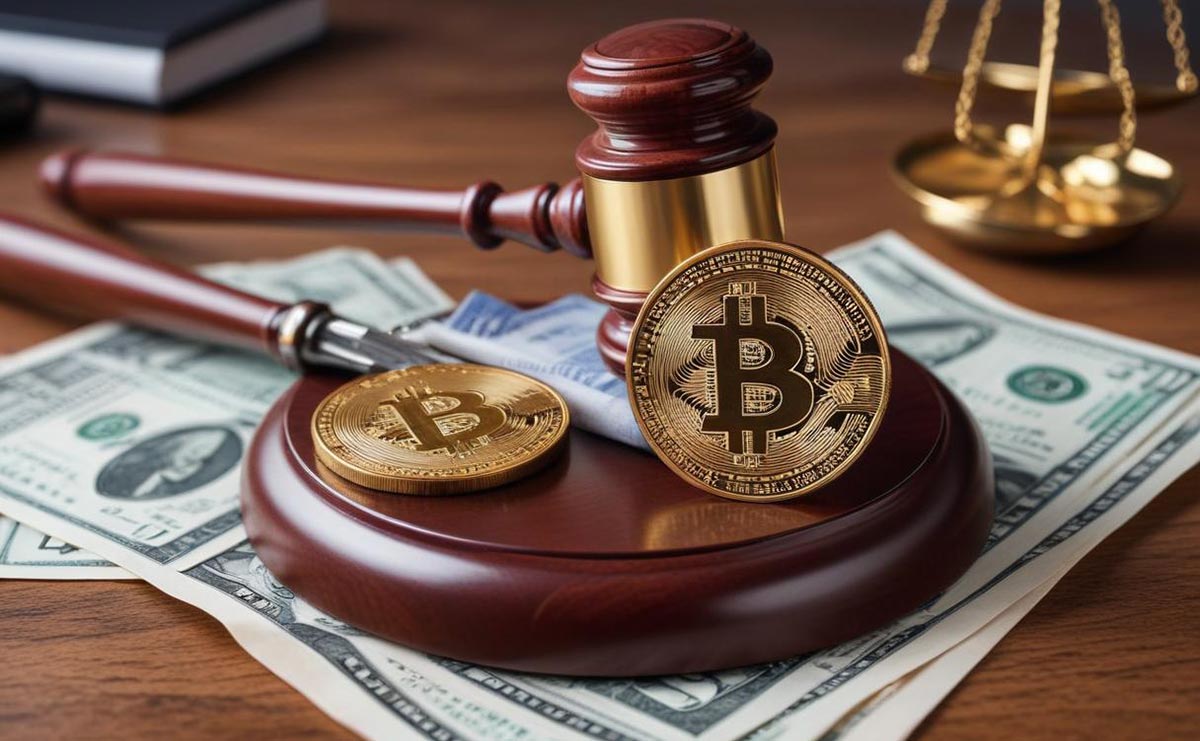Contents
Understanding U.S. Government Cryptocurrency Regulations
Cryptocurrencies have revolutionized the financial landscape, offering new opportunities for investment, transactions, and economic innovation. However, the rapid growth and adoption of digital assets have also brought significant regulatory challenges. In the United States, cryptocurrency regulations are multifaceted, involving various federal and state authorities, each with distinct roles and responsibilities. Understanding these regulations is essential for anyone involved in the cryptocurrency market, from investors to businesses and policymakers.
Cryptocurrency adoption and growth are notable in several countries, driven by various factors such as economic conditions, regulatory environments, and technological advancements. Countries like Vietnam, the Philippines, Nigeria, India, Brazil, Argentina, and Turkey have seen a high adoption rate of cryptocurrencies.
Regulatory Landscape of the Cryptocurrency Market
America’s slow-moving confused crypto regulation is evolving rapidly as governments and regulatory bodies worldwide strive to address the challenges and risks associated with digital assets. Here are some key regulatory aspects of the crypto market:
Regulatory Frameworks
- Jurisdictional Variations: Different countries have varying approaches to regulating cryptocurrencies. Some, like Japan and Switzerland, have established comprehensive regulatory frameworks, while others, like China, have imposed strict bans on certain crypto activities.
- Licensing Requirements: Many jurisdictions require crypto exchanges and service providers to obtain licenses. These licenses often mandate compliance with Anti-Money Laundering (AML) and Know-Your-Customer (KYC) regulations.
Anti-Money Laundering (AML) and Know Your Customer (KYC) Regulations
- AML Compliance: Crypto businesses must implement measures to prevent money laundering and terrorist financing. This includes monitoring transactions, reporting suspicious activities, and maintaining records.
- KYC Procedures: Businesses must verify the identities of their customers to prevent illicit activities. This often involves collecting personal information and documentation.
Securities Regulation
- Token Classification: Regulators determine whether certain cryptocurrencies and tokens qualify as securities. If classified as securities, these tokens must comply with relevant securities laws.
- Initial Coin Offerings (ICOs) and Security Token Offerings (STOs): ICOs and STOs are subject to securities regulations, including registration requirements and investor protections.
Taxation
- Tax Reporting: Crypto transactions are subject to taxation in many countries. This includes capital gains tax on profits from trading and income tax on earnings received in cryptocurrencies.
- Tax Guidance: Governments provide guidelines on how cryptocurrencies should be taxed. These guidelines cover areas such as reporting obligations and valuation methods.
Consumer Protection
- Investor Protections: Regulations often include measures to protect investors from fraud and market manipulation. This includes disclosures, advertising standards, and limits on retail investor participation in high-risk crypto investments.
- Redress Mechanisms: Regulatory frameworks may establish mechanisms for consumers to seek redress if they experience losses due to fraudulent activities or platform failures.
Market Integrity
- Market Surveillance: Regulatory bodies monitor crypto markets for signs of manipulation, fraud, and other unfair practices. This includes overseeing trading activities and ensuring the integrity of market operations.
- Stablecoin Regulation: Stablecoins, which are pegged to fiat currencies or other assets, are receiving increased regulatory scrutiny due to their potential impact on financial stability.
International Coordination
- Global Standards: International organizations, such as the Financial Action Task Force (FATF), are developing global standards for crypto regulation to ensure consistency across jurisdictions.
- Cross-Border Collaboration: Regulatory authorities collaborate across borders to address the challenges posed by the global nature of the crypto market. This includes sharing information and coordinating enforcement actions.
Regulatory Sandboxes
- Innovation Support: Some jurisdictions have established regulatory sandboxes to allow crypto businesses to test new products and services in a controlled environment with regulatory oversight.
- Balancing Innovation and Risk: Sandboxes aim to balance fostering innovation with ensuring that appropriate consumer protections and risk management practices are in place.
Central Bank Digital Currencies (CBDCs)
- Government-Issued Digital Currencies: Several central banks are exploring or piloting CBDCs as a regulated digital alternative to cryptocurrencies. These initiatives are aimed at enhancing payment systems and providing a stable digital currency option.
The regulatory landscape for the cryptocurrency market is complex and dynamic. It is essential for crypto businesses and investors to stay informed about regulatory developments and comply with applicable laws to navigate this evolving space successfully.
Is Crypto Regulated by SEC?
Yes, the U.S. Securities and Exchange Commission (SEC) regulates aspects of the cryptocurrency market, particularly when digital assets are classified as securities. The SEC plays a crucial role in regulating cryptocurrencies that are deemed securities, ensuring compliance with securities laws, protecting investors, and maintaining market integrity. Companies and individuals involved in the issuance, trading, and management of digital assets must navigate these regulatory requirements to operate legally in the U.S.
Here are the key points on SEC crypto regulation:
Securities Classification
- The SEC applies the “Howey Test” to determine whether a cryptocurrency or token is a security. The Howey Test assesses whether an investment of money in a common enterprise with an expectation of profits derived from the efforts of others constitutes a security.
- The SEC has taken action against numerous ICOs for offering unregistered securities. If an ICO meets the criteria of security, it must comply with SEC regulations, including registration and disclosure requirements.
Regulation of Cryptocurrency Exchanges
- Cryptocurrency exchanges that offer trading of tokens classified as securities must register with the SEC as national securities exchanges or operate under an exemption. This ensures that they comply with regulatory standards designed to protect investors and maintain market integrity.
Enforcement Actions
- The SEC has been active in enforcing securities laws in the cryptocurrency space. High-profile cases include actions against major exchanges and ICOs for violations such as fraud, market manipulation, and unregistered securities offerings.
- Companies and individuals found in violation of securities laws face penalties, including fines and orders to cease operations. In some cases, the SEC has negotiated settlements that include refunds to investors and commitments to comply with regulations going forward.
Investor Protection
- When cryptocurrencies are classified as securities, issuers must provide detailed disclosures about their projects, financial condition, and risks involved. These requirements aim to protect investors by ensuring they have access to essential information for making informed decisions.
- The SEC actively works to prevent fraudulent schemes in the crypto market, including Ponzi schemes and false representations about potential returns on investments.
Regulatory Guidance and Clarity
- The SEC has issued guidance on how it applies federal securities laws to digital assets. This includes the “Framework for ‘Investment Contract’ Analysis of Digital Assets,” which helps market participants determine whether a digital asset is a security.
- SEC officials, including the Chairman, regularly provide public statements and testimonies to offer clarity on regulatory approaches and the application of securities laws to cryptocurrencies.
Application of the Howey Test in Cryptocurrencies
The Howey Test is a legal framework used to determine whether a transaction qualifies as an “investment contract” and, therefore, should be regulated as a security under U.S. federal law. Originating from the Supreme Court case SEC v. W.J. Howey Co. (1946), it helps the Securities and Exchange Commission (SEC) evaluate various financial instruments, including cryptocurrencies and Initial Coin Offerings (ICOs).
Applying the Howey Test
To determine if a financial transaction is an investment contract, the Howey Test examines four criteria:
- Investment of Money: There must be an investment of money or other assets. This involves participants putting something of value at risk, typically money.
- Common Enterprise: The investment must be in a common enterprise, which can be assessed through:
-
- Horizontal Commonality: The pooling of investors’ funds, where profits and losses are shared.
- Vertical Commonality: The relationship between the investor and the promoter, where the investor’s fortunes are tied to the promoter’s efforts.
-
- Expectation of Profits: Investors must expect to earn profits from their investments. These profits can come in various forms, such as dividends, periodic returns, or capital appreciation.
- Derived from the Efforts of Others: The success and profitability of the investment must primarily come from the efforts of a third party, such as the project’s promoters or developers, rather than the investors themselves.
Example: Applying the Howey Test to Cryptocurrencies
When evaluating whether a cryptocurrency or ICO is a security, you can apply the Howey Test as follows:
- Investment of Money: Participants buy tokens or coins with money or other cryptocurrencies.
- Common Enterprise: Investors’ funds are pooled, and their fortunes are tied to the overall success of the project.
- Expectations of Profits: Investors anticipate that the value of the tokens will increase as the project becomes successful.
- Efforts of a Third Party: The project’s success relies on the efforts and management of its developers and promoters, not the investors themselves.
If a cryptocurrency or ICO meets all the criteria of the Howey Test, it is likely to be considered a security. Consequently, it must comply with SEC regulations, including registration requirements and investor protection laws.
Cryptocurrency Legal Cases in The United States In 2024
In 2024, several significant cryptocurrency legal cases in the United States are shaping the regulatory landscape for digital assets. Here are some key cases and developments:
SEC vs. Coinbase and Binance
The U.S. Securities and Exchange Commission (SEC) has ongoing cases against major crypto exchanges Coinbase and Binance. The core issue revolves around whether these exchanges have violated securities laws by offering unregistered securities. The outcomes of these cases are expected to set precedents for how crypto assets are classified and regulated in the future.
Supreme Court Case Involving Coinbase
For the first time, the U.S. Supreme Court is hearing a crypto-related case. Coinbase is challenging the right of plaintiffs in class-action lawsuits to avoid arbitration, which could significantly impact how consumer disputes in the crypto sector are resolved. This case addresses broader questions about arbitration clauses and their applicability to digital asset transactions.
Ripple Labs vs. SEC
The ongoing battle between Ripple Labs and the SEC over the classification of XRP as security continues to be a focal point. The case’s resolution could have far-reaching implications for other cryptocurrencies and their regulatory treatment. A decision is expected in 2024, which could either bolster or challenge the SEC’s approach to regulating digital assets.
IRS and Cryptocurrency Taxation
The IRS is increasing its enforcement actions related to cryptocurrency tax compliance. New rules are being proposed to expand the definition of a “broker” to include crypto platforms, which would require them to report user transactions to the IRS. This move aims to improve tax compliance and reduce evasion but has faced criticism from the crypto industry for its potential to stifle innovation.
New SEC Regulations
The SEC is expected to introduce new regulations that could redefine what constitutes a securities exchange to include crypto platforms. Additionally, new rules may mandate that investment advisers use qualified custodians for their clients’ crypto assets. These regulatory changes are anticipated to bring more clarity but also more compliance burdens on the industry.
These cases and regulatory developments highlight the dynamic and often contentious relationship between the cryptocurrency industry and U.S. regulatory bodies. The outcomes of these legal battles will be crucial in determining the future regulatory framework for digital assets in the United States.
U.S. Crypto Regulations 2023 and 2024
Cryptocurrency exchanges in the U.S. are subject to comprehensive regulation by multiple federal and state authorities. The regulatory landscape for cryptocurrencies in the United States has been evolving rapidly, with significant developments in 2023 and anticipated changes in 2024. Here is an overview of the key regulatory actions and proposed rules during these years.
2023 Developments
- SEC Enforcement Actions
The SEC ramped up enforcement actions against major cryptocurrency exchanges, including Coinbase and Binance, accusing them of offering unregistered securities. These actions aimed to bring crypto platforms in line with existing securities laws. Ripple Labs’ ongoing legal battle with the SEC over the classification of XRP as a security continued to be a major focal point. This case’s outcome could set a precedent for other digital assets.
- Regulatory Proposals
The SEC proposed rules to expand the definition of “exchange” to include crypto platforms. This would bring more trading platforms under the agency’s regulatory umbrella. The IRS proposed new rules requiring crypto platforms to report user transactions, aiming to improve tax compliance. This proposal faced opposition from the industry, citing potential impacts on innovation.
- Executive Orders and Legislative Actions
The Biden administration issued executive orders directing federal agencies to develop a comprehensive approach to regulating cryptocurrencies. This included efforts to address consumer protection, financial stability, and illicit finance risks. Several bills were introduced in Congress to provide clearer regulatory frameworks for digital assets, though progress was slow, and no major legislation was passed in 2023.
2024 Anticipated Changes
- Key Legal Cases
The U.S. Supreme Court is set to hear its first crypto-related case, involving Coinbase’s attempt to force arbitration in class-action lawsuits. This case could significantly impact how consumer disputes are handled in the crypto sector. The resolution of the Ripple Labs vs. SEC case is expected, which could provide much-needed clarity on the classification of digital assets as securities.
- New SEC Regulations
The SEC is expected to finalize rules expanding the definition of “exchange” and requiring investment advisers to use qualified custodians for their clients’ crypto assets. These rules aim to enhance investor protection and market integrity. Potential regulations targeting decentralized finance (DeFi) platforms and stablecoins are also on the horizon, reflecting concerns over financial stability and consumer protection.
- Legislative Developments
Congress may make progress on digital assets regulation, with proposed bills focusing on areas like stablecoin regulation and the broader crypto market structure. However, significant legislative action may still be delayed due to political gridlock.
- Taxation and Compliance
The IRS is expected to implement and enforce new reporting requirements for crypto transactions, aimed at closing tax evasion loopholes and ensuring better compliance. These rules could have a substantial impact on the operations of crypto exchanges and other service providers.
The U.S. regulatory environment for cryptocurrencies is poised for significant changes, driven by enforcement actions, legal cases, and new regulatory proposals. While 2023 saw increased regulatory scrutiny and enforcement, 2024 is expected to bring more clarity and comprehensive regulations that will shape the future of the crypto industry in the United States.
US Banks and Cryptocurrencies
In the United States, the relationship between banks and cryptocurrencies is complex and varies widely among institutions. While some banks are open to engaging with cryptocurrency services and transactions, others are more cautious or even restrictive. Here is an overview of how U.S. banks handle cryptocurrency:
Banks Offering Cryptocurrency Services
A few U.S. banks have started to embrace cryptocurrency by offering related services:
- JPMorgan Chase: JPMorgan has shown interest in blockchain technology and has created its own digital currency, JPM Coin, for facilitating instant payments between institutional accounts. The bank also provides banking services to major cryptocurrency exchanges like Coinbase and Gemini.
- Bank of New York Mellon (BNY Mellon): BNY Mellon announced plans to offer custody services for digital assets, providing a way for institutional investors to store and manage cryptocurrencies securely.
- Silvergate Bank: Known for its focus on the digital currency industry, Silvergate Bank offers a range of banking services tailored to cryptocurrency businesses, including real-time payment solutions through its Silvergate Exchange Network (SEN).
- Signature Bank: Signature Bank provides banking services to cryptocurrency clients through its Signet platform, which allows real-time payments and transactions using blockchain technology.
Banks Restrictive or Cautious About Cryptocurrency
Several U.S. banks are more cautious about dealing with cryptocurrencies, citing concerns about regulatory compliance, security, and the volatile nature of digital assets:
- Wells Fargo: Wells Fargo has taken a conservative stance on cryptocurrencies, restricting its clients from using their credit cards to purchase digital assets. The bank has also issued warnings about the risks associated with investing in cryptocurrencies.
- Bank of America: While Bank of America has filed numerous blockchain patents, it has generally been restrictive regarding cryptocurrency transactions, particularly by not allowing its credit cards to be used for crypto purchases. The bank is concerned about compliance with regulations and potential fraud.
Regulatory Considerations and Compliance
U.S. banks are highly regulated and must comply with stringent anti-money laundering (AML) and know-your-customer (KYC) requirements. This regulatory environment makes many banks cautious about fully embracing cryptocurrencies, as they need to ensure that all transactions comply with federal and state laws.
- FinCEN Regulations: Banks must comply with FinCEN regulations, which require robust AML and KYC protocols to prevent illicit activities like money laundering and terrorist financing.
- OCC Guidance: The Office of the Comptroller of the Currency (OCC) has provided guidance allowing national banks to offer custody services for cryptocurrencies and use stablecoins for payment activities, provided they comply with existing regulations.
While there is a growing acceptance of cryptocurrencies among certain U.S. banks, many remain cautious due to regulatory concerns and the volatility of digital assets. The trend is slowly changing as more institutions explore ways to integrate cryptocurrency services, driven by increasing demand from clients and advancements in regulatory clarity.
Who Is Impacted by Cryptocurrency Regulations in the US?
Crypto laws US impact a wide range of stakeholders in the digital asset ecosystem. Here are the key groups affected:
Cryptocurrency Exchanges
Cryptocurrency exchanges, such as Coinbase and Binance, are significantly impacted by U.S. regulations. They must comply with various federal crypto regulations and state laws, including registration requirements with the SEC if they are deemed to offer securities. They also need to implement robust AML (Anti-Money Laundering) and KYC (Know Your Customer) procedures to prevent illicit activities.
Investors and Traders
Individual investors and traders are affected by tax regulations and reporting requirements. The IRS mandates that crypto transactions be reported for tax purposes, and gains from cryptocurrency trading are subject to capital gains tax. Additionally, new regulations might require detailed reporting of crypto holdings and transactions.
Crypto Miners
Cryptocurrency miners are impacted by regulations regarding the taxation of mined coins and potential environmental regulations. Miners must report the fair market value of mined cryptocurrencies as income at the time of mining. Future regulations may also address the environmental impact of mining activities.
DeFi Platforms
Decentralized Finance (DeFi) platforms, which operate without central intermediaries, face increasing regulatory scrutiny. These platforms must ensure compliance with AML and KYC requirements, even though their decentralized nature poses unique challenges. The potential new rules from the SEC and other regulators could significantly affect how these platforms operate.
Stablecoin Issuers
Issuers of stablecoins, such as Tether and USD Coin, are subject to regulations ensuring they maintain adequate reserves and provide transparency regarding their operations. These regulations aim to ensure that stablecoins are reliable and that they do not pose risks to the financial system.
Financial Institutions
Banks and other financial institutions that offer crypto-related services are affected by regulations requiring them to adhere to AML and KYC laws, safeguard client assets, and report suspicious activities. The growing integration of cryptocurrencies into traditional financial services brings increased regulatory obligations for these institutions.
Developers and Blockchain Projects
Developers and teams behind blockchain projects and ICOs (Initial Coin Offerings) need to navigate securities laws to determine if their tokens are classified as securities. This affects how they conduct their token sales and ongoing compliance requirements.
Consumers
Consumers using cryptocurrencies for transactions are also impacted. They must be aware of the tax implications of using cryptocurrencies and may be subject to increased reporting requirements. Consumer protection regulations aim to safeguard against fraud and ensure transparency in the crypto market.
All in all, the evolving regulatory landscape for cryptocurrencies in the U.S. aims to protect consumers, ensure market integrity, and prevent illicit activities while fostering innovation in the digital asset space. Stakeholders across the ecosystem, from exchanges and investors to miners and developers, must stay informed and compliant with these regulations to navigate the complexities of the crypto market successfully.

The Future of the Crypto Market and NFTs
The legal landscape for Non-Fungible Tokens (NFTs) and the broader crypto market is rapidly evolving, influenced by emerging regulations, enforcement actions, and legal interpretations.
Increased Regulatory Clarity
As the NFT market grows, legislators are expected to introduce more specific laws and regulations to address the unique aspects of digital assets. This includes clarifying the application of existing securities, tax, and IP laws to NFTs. International regulatory bodies may collaborate to create cohesive frameworks, given the borderless nature of blockchain and NFTs. Harmonized regulations can help reduce legal uncertainties and promote market stability.
Technological Innovations
The use of smart contracts in NFTs can automate compliance with legal requirements, such as royalty payments and IP rights enforcement. Advancements in this area could streamline legal processes and enhance transparency. Improved interoperability between different blockchain platforms can facilitate the transfer and use of NFTs across various ecosystems, potentially increasing their utility and market acceptance.
Market Trends and Adoption
As more mainstream companies and artists enter the NFT space, the market is likely to grow, attracting more scrutiny and necessitating robust legal frameworks. NFTs are expanding beyond digital art to include use cases such as virtual real estate, gaming, and tokenized real-world assets. This diversification will require tailored regulatory approaches to address the specific needs and risks of different sectors.
The regulation of NFTs and the broader crypto market is still in its formative stages, with significant developments expected in the near future. Legal clarity and robust frameworks will be crucial in fostering innovation while protecting consumers and ensuring market integrity. Stakeholders should stay informed about regulatory changes and engage with legal experts to navigate the evolving landscape successfully.
International Approaches to Cryptocurrency Regulation
Cryptocurrency regulation varies widely across different countries, reflecting each jurisdiction’s unique priorities, regulatory philosophies, and economic environments. The common goals among these jurisdictions are to prevent illicit activities, protect consumers, and ensure market stability while fostering technological innovation in the financial sector.
European Union (EU)
Market in Crypto-Assets Regulation (MiCA)
- Harmonized Framework: The EU is developing the MiCA framework to create a unified regulatory environment across member states. This aims to provide legal clarity and consumer protection while fostering innovation.
- Scope of MiCA: The regulation will cover issuers of crypto-assets, crypto-asset service providers, and stablecoins. It includes requirements for transparency, disclosure, authorization, and supervision of transactions.
- Anti-Money Laundering (AML): The EU’s AML directives require cryptocurrency exchanges and wallet providers to implement stringent AML and KYC measures to prevent illicit activities.
Japan
Financial Services Agency (FSA)
- Centralized Oversight: Japan’s FSA is responsible for regulating the cryptocurrency market. The country was one of the first to recognize Bitcoin and other cryptocurrencies as legal property.
- Registration and Compliance: Cryptocurrency exchanges must register with the FSA and comply with rigorous AML and KYC regulations. Japan’s regulatory framework is considered one of the most comprehensive and clear.
Switzerland
Swiss Financial Market Supervisory Authority (FINMA)
- Crypto-Friendly Environment: Switzerland offers a progressive regulatory environment with clear guidelines for ICOs and favorable tax treatment for cryptocurrencies.
- Focus on Innovation: FINMA has established detailed regulatory guidelines that promote blockchain innovation while ensuring compliance with financial regulations.
China
Strict Control and Bans
- Banning ICOs and Exchanges: China has implemented stringent regulations, including banning ICOs and cryptocurrency exchanges to control the financial system and prevent capital outflows.
- Digital Yuan Development: Despite the strict bans, China is actively developing its own central bank digital currency (CBDC), the digital yuan, to maintain control over digital financial transactions within its borders.
United Kingdom
Financial Conduct Authority (FCA)
- Registration and Compliance: The FCA requires all crypto businesses to register and comply with AML regulations. It also provides oversight to ensure consumer protection and market integrity.
- Banning Retail Crypto Derivatives: The FCA has banned the sale of crypto derivatives and exchange-traded notes to retail consumers, citing concerns over volatility and potential financial harm.
Singapore
Monetary Authority of Singapore (MAS)
- Balanced Regulation: Singapore’s MAS aims to balance innovation and regulation by providing clear guidelines while encouraging fintech growth.
- Payment Services Act: This comprehensive regulatory framework covers digital payment token services, requiring firms to comply with AML and KYC requirements.
Australia
Australian Transaction Reports and Analysis Centre (AUSTRAC)
- AML/KYC Requirements: AUSTRAC requires cryptocurrency exchanges to register and comply with AML and KYC regulations to prevent money laundering and terrorist financing.
- Consumer Protection: Australia also emphasizes consumer protection and has been working on comprehensive regulatory measures to ensure market integrity.
Canada
Canadian Securities Administrators (CSA) and Financial Transactions and Reports Analysis Centre of Canada (FINTRAC)
- Regulatory Coordination: The CSA and FINTRAC work together to regulate cryptocurrency exchanges, ensuring they comply with securities laws and AML requirements.
- Framework for Crypto Platforms: Canada has been developing frameworks to provide clarity on the regulation of cryptocurrency trading platforms and their obligations under existing laws.
Conclusion
In conclusion, the regulatory landscape for cryptocurrencies is both intricate and dynamic, reflecting the diverse approaches of various jurisdictions to manage the rapid growth and adoption of digital assets. While countries like Japan and Switzerland have established clear and supportive regulatory frameworks, others like China have implemented strict controls. In the United States, regulatory efforts are multifaceted, involving numerous federal and state authorities, each with distinct roles. The SEC’s ongoing actions against major exchanges and ICOs underscore the importance of compliance with securities laws. As the cryptocurrency market continues to evolve, staying informed and compliant with applicable regulations is crucial for all stakeholders, from investors and businesses to policymakers, to navigate this complex space successfully.
Frequently Asked Questions
Is Crypto Illegal in the US?
It is legal to trade cryptocurrency in the USA. In fact, it is legal to buy, sell, hold, and use cryptocurrencies across the country. However, the regulatory environment around cryptocurrencies is complex and varies depending on the federal and state jurisdictions involved.
Is Bitcoin Legal in the US?
Yes, Bitcoin is legal in the United States. However, its use and regulation are subject to various laws and regulations at both the federal and state levels.
Are Cryptocurrencies Regulated?
Yes, cryptocurrencies are regulated in many countries, including the United States. The regulation of cryptocurrencies aims to ensure market integrity, protect consumers, prevent illicit activities, and integrate cryptocurrencies into the broader financial system in a safe and compliant manner.
How Does the US Approach to Cryptocurrency Different from other Countries?
The U.S. approach to cryptocurrency regulation is marked by its complexity and the involvement of multiple regulatory bodies, each focusing on different aspects of the crypto market. In contrast, other countries often have more centralized and streamlined regulatory frameworks, which can provide clearer guidance for compliance. The differences in regulatory approaches reflect varying priorities, such as investor protection, financial stability, innovation, and control.
Who Regulates Cryptocurrency in the US?
Crypto trading is legal in the United States and US crypto laws are managed by multiple federal and state agencies, each with distinct roles. The SEC oversees securities-related aspects, including ICOs; the CFTC regulates cryptocurrency derivatives like futures and options; FinCEN enforces AML and KYC requirements; the IRS handles taxation, treating cryptocurrencies as property; and the OCC provides guidance for banks engaging in crypto activities. Additionally, state regulators, such as those in New York with the BitLicense, impose local regulations.
Disclaimer: The content provided on this blog is for informational purposes only and does not constitute legal, financial, or professional advice.






